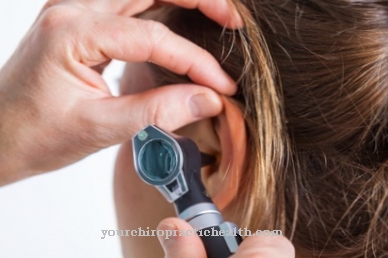Bladder pain are also called Urinary bladder pain or as Cystodynia designated. The pain usually occurs as a result of inflammation and irritation in the area of the bladder wall. Bladder pain can be acute as well as chronic.
What is bladder pain?

Bladder pain often occurs as part of a urinary tract infection, such as a bladder infection. Symptoms can include pain over the pubic bone, painful burning sensation when urinating or a frequent need to urinate.
In the small pelvis on the pelvic floor, the urinary bladder is located in the area of the pubic bone. It is a muscular hollow organ of the lower urinary tract and stores the urine. In addition, the bladder is connected to the two kidneys via a ureter each. The urine is then excreted through the urethra.
causes
Above all, bladder pain is caused by difficult urination. This is also known as urinary urgency or urinary retention. But other causes, such as bladder stones, foreign bodies in the bladder, bladder tumors, prostate diseases and gynecological diseases can lead to bladder pain.
The most common cause is a urinary tract infection in the form of a cystitis or urethritis. There is usually painful, burning urination with difficult urination at the same time.
Young women, pregnant women or women going through menopause are very prone to bladder pain and urinary tract infections.
Diseases with this symptom
- Prostate enlargement
- Ureteral stone
- Cystitis
- Irritable bladder
- Bladder diverticulum
- Bladder cancer
- Incontinence
- Urethritis
- Vaginitis
- Uterus subsidence
- Bladder stones
- Chlamydial infection
diagnosis
With strong and recurring Bladder pain a doctor should be consulted. First, the doctor will ask where exactly the pain is and how long has the bladder pain existed. Questions are also asked about other complaints, such as frequent urination or burning sensation when urinating, pain in the flanks or fever.
Among other things, the doctor will tap the kidney bed in the flank area and take a blood sample. The blood is mainly examined for inflammation values. The urine can then be tested for leukocytes and nitrite with a test stick.
The doctor can also create a urine culture so that the pathogen can be specifically identified. So he can then also prescribe a suitable antibiotic. If the doctor suspects foreign bodies, stones or bladder tumors as the cause, further diagnostic methods, such as ultrasound or X-ray examination, are useful.
Complications
Bladder pain can lead to a variety of complications, depending on the cause. If left untreated, the bladder pain initially develops into a chronic infection of the urinary tract, which can later spread to the kidneys. If the pain is accompanied by a serious illness such as a tumor or an infection of the internal organs, chronic, sometimes life-threatening symptoms such as urinary retention can occur.
Bladder pain attributed to urinary bladder infection can cause diffuse infection and chronic pain in the urinary region. In severe cases, sepsis occurs, which can be fatal if left untreated. If there is inflammation of the urinary tract, it can develop into kidney inflammation or a tumor. Ureteral stones or an enlarged prostate are possible complications. Urinary bladder pain, a symptom of tuberculosis, is also problematic and can lead to infections or serious illness. Regardless of the underlying disease, bladder pain is almost always accompanied by strong feelings of malaise.
Those affected feel limp, tired and powerless, and an infection or cystitis can also lead to dehydration. If the bladder pain is based on drug treatment with drugs such as cyclophosphamide or irradiation of the pelvis, the complications are usually harmless and disappear after a few days. Nevertheless, it is advisable to consult a doctor if the urinary bladder pain persists.
When should you go to the doctor?
Bladder pain is usually an indication of a bladder infection. This should be fought from the very beginning. Fever and lower back pain require an examination with a urologist. If the cystitis is dragged on, it can develop into a chronic, difficult-to-treat disease.
Admixtures in the urine are another warning sign. A visit to the doctor is important because there are various possible causes of illness. A fungal infection can cause a burning sensation when urinating and accompanying pain. This, too, can only be treated with appropriate medication prescribed by a specialist. Acute bladder infections show up as severe pain. The patient should drink a lot because the liquid washes germs out of the body.
If there is no improvement after self-medication with herbal remedies such as teas, medical help must always be sought. Diabetics, pregnant women, patients with bladder dysfunction and people who regularly take medication must always consult a doctor.
Some risk factors can be avoided in everyday life. Hypothermia and a weak immune system promote urinary tract infections. Due to their anatomy, women are more prone to bladder infections than men. Therefore, you should keep your lower back as warm as possible and avoid sitting on cold stones. Changes to the prostate can also lead to frequent bladder infections. To clarify the exact cause, it is important to see a doctor.
Doctors & therapists in your area
Treatment & Therapy
For bladder pain, the therapy is always based on the underlying cause. The most common cause of bladder pain is a bacterial urinary tract infection, which is treated with antibiotics.
It is also recommended to drink enough fluids and to ensure good intimate hygiene. Painkillers and anti-spasmodic drugs can help against bladder pain itself.
If bladder tumors, bladder stones or foreign bodies are found, surgical therapy must be carried out here. Often this is achieved with a cystoscopy. In addition, bladder stones can be shattered using shock wave therapy.
Since bladder pain tends to keep coming back, in many cases preventive measures can be taken to prevent it from recurring. Since the bladder is very sensitive to the cooling of the abdomen and feet, this should be avoided. Standing in the cold for too long can also affect the bladder.
In addition, you shouldn't overdo it with a refreshing dip in summer. Above all, drinking a lot in everyday life can prevent cystitis. About 2 to 3 liters of fluid should be consumed daily. A large part of this should consist of water and herbal tea, so that the bladder is always well flushed and bacteria cannot settle.
Toilet hygiene is just as important for prevention. Women in particular should definitely wipe from front to back when going to the toilet, as this is the only way to prevent bacteria from reaching the urethra from the intestines.
Outlook & forecast
If the natural protective function of the body, the immune system, is reduced, urinary tract infections occur more easily in women. For anatomical reasons, the path from bacteria to the urinary bladder is shorter in women than in men. In many cases, bacteria are also carried from the anus to the urethra. People with a weak immune system are therefore more susceptible to infections, which is increased in stressful situations.
Some medications, physical exercise and diabetes also increase the susceptibility to infections. In order to protect against future bladder infections, the immune system should generally be strengthened. A healthy diet, adequate sleep, plenty of exercise in the fresh air and avoiding alcohol and cigarettes make an important contribution here.
Excessive intimate hygiene in women can increase the tendency to develop bladder infections. Some soaps destroy the skin's natural protective acid mantle, making it easier for pathogens to lodge. If necessary, affected women should bring about changes here.
Once a cystitis has subsided, preventive measures should be taken. It is important to wear warm clothing in winter. The kidneys and pelvis in particular need to be protected from hypothermia. Sitting on cold stones does not make sense. In acute cases, drinking plenty of fluids also helps as a preventive measure. The fluid flushes bacteria out of the urinary tract. Herbal teas are ideal for this. Kidney and bladder teas are supportive of drug treatment. In severe cases, antibiotics must be given.
prevention
To prevent bladder pain, you should avoid taking full baths that are too hot, because the heat stimulus can have a similar irritating effect on the bladder as a strong cold stimulus.
In addition, the mucous membranes are softened in full baths, so that they tend to become inflamed. Finally, in the warm bath water, the bacteria can more easily migrate from the anus region to the urethra. Full baths should be taken as infrequently as possible and only last 5 to 10 minutes.
Recurrent bladder infections are also often related to sexual intercourse (e.g. anal intercourse). In this way, bacteria can get into the urethra through hygiene errors. For this reason, both partners should wash before and after intercourse.
You can do that yourself
Once the cause of bladder pain has been clarified with a doctor, those affected can do a lot themselves to improve their wellbeing. The most common cause of a sore urinary bladder is a urinary tract infection, which affects the urethra as well as the bladder itself. In addition to conventional medical methods, there are also a number of home remedies and herbal medicines available, especially in minor cases.
Bearberry leaf tea is such a popular home remedy. Bearberry leaves, which are available in pharmacies, not only have anti-inflammatory and antimicrobial effects, but also protect the mucous membrane. They are therefore an effective urinary tract antiseptic that also has an analgesic effect. Cranberry-based preparations also promise success. The cranberries from North America contain the active ingredient proanthocyanidin, a secondary plant substance that has a strong antibacterial effect. In addition, due to their high content of vitamins and minerals, cranberries increase the body's defenses. A painful cystitis can be overcome faster and new infections can be prevented.
Physical therapies also have a pain-relieving effect on urinary tract infections. A hot water bottle on the lower abdomen or a warm hip bath can quickly subside mild bladder pain. Drinking a lot, especially mineral water and fruit or herbal tea, also helps to reduce bladder pain quickly.



.jpg)




















.jpg)



